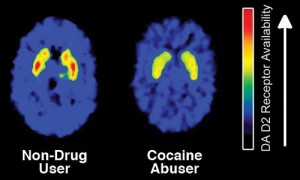Why Cocaine Is Highly Addictive
Psychological Effects of Cocaine
Cocaine has an incredibly dominant stimulating effect on the nervous system. It increases levels of dopamine, which is a neurotransmitter that is associated to pleasure and activity in the reward circuit of the brain. The effects of cocaine tend to last up to thirty minutes, though some methods of taking cocaine only affect the user for five minutes.
A pleasurable stimulus, such as smelling your favourite food, causes neurons to release dopamine. Dopamine is then recycled back into the same neuron, which cuts off the signal between neurons. Cocaine prevents the dopamine from returning into the neuron, therefore stopping it from being recycled, and results in a build-up of dopamine.

This increases the message to and response of the receptive neurons, and eventually disturbs natural communication. The additional dopamine causes the user to feel an enhanced sense of euphoria, wellbeing, energy, alertness and motor activity. Some cocaine users also describe increased feelings of competence and sexuality.
Long-term use of cocaine can cause the brain’s reward system to change gradually, along with other brain systems, and greatly increases the risk of addiction. These brain changes alter the way a person feels and thinks. Cocaine addicts have an uncontrollable, overwhelming need for cocaine, despite the consequences. Users who become addicted end up choosing to take cocaine instead of engaging in other activities, which can cause lifestyle changes that worsen with the addiction.
Physical Changes in the Brain of Cocaine Addicts
Researchers at the University of Cambridge found that abnormal brain structures in the frontal lobe of cocaine users’ brains are linked to their compulsive cocaine-using behaviour. Dr Karen Ersche, from the University of Cambridge’s Behavioural and Clinical Neuroscience Institute (BCNI), and a team of researchers scanned the brains of 120 people, 60 of whom were cocaine dependent. They found that the cocaine users had extensive grey matter loss that was directly associated to the duration of cocaine usage. The longer the person had been abusing cocaine, the greater the loss of grey matter. They also found that the individuals with the most volume reduction had the most cocaine compulsivity.
The researchers also noticed that the basal ganglia, or the areas of the brain reward system where cocaine is active, were considerably larger in cocaine users. However, the size of the expansion did not correlate with the length of cocaine use. This caused the researchers to believe that the changes in the brain’s reward system existed prior to cocaine abuse, which means that certain individuals could naturally be more vulnerable to the effects of cocaine.
Dr Ersche stated, ‘This research gives us important insight into why some people are more vulnerable to drug addiction. Not only is this important for the future development of more effective therapeutic interventions for people who have become dependent on drugs, it will also inform improved strategies to prevent drug addiction in the first place.’
‘Our findings are important because they show a clear relationship between the brain, the duration of cocaine use and some of the common attention problems that people with cocaine dependence report. These data show that cocaine dependence is a disorder of the brain, which is very relevant information for the treatment of people who are trying to beat their addiction.’
Ready to Get Help?
Contact us today to find out how you can help your loved one overcome their addiction
Repeated Cocaine Use
When a user takes cocaine repeatedly, the drug can cause long-term effects in a variety of the brain systems, such as its reward system. These effects can lead to addiction. Additionally, repeated cocaine use increases the users tolerance to the effects of cocaine. Cocaine addicts often state that they try to reach the same levels of pleasure as they did from their first encounter, but are not able to.
According to the US National Institute on Drug Abuse, ‘with repeated use, tolerance to the cocaine high also often develops. Many cocaine abusers report that they seek but fail to achieve as much pleasure as they did from their first exposure.’
Users tend to increase their dose in order to maintain that same level of pleasure, or to increase and lengthen their high. The danger of this is that increasing the dose can also increase the risk of adverse physiological or psychological effects.
Because of cocaine’s stimulating effects, when a user stops taking cocaine they tend to ‘crash’. This crash is often followed with a strong craving for more of the drug. It is common for cocaine users to experience a lack of pleasure, fatigue, paranoia, anxiety and sleepiness once they start to come off the drug. These symptoms can also lead to feelings of irritability and depression. In extreme cases, cocaine users can start to feel suicidal.
Though the cravings can be intense at the initial stage of the withdrawal, they can become even worse later on.
Long Term Effects of Cocaine Use

Cocaine can affect the body in a number of ways. It dilates pupils, constrains blood vessels and increases heart rate, blood pressure (hypertension) and body temperature. Aside from addiction itself, cocaine can cause gastrointestinal complications, such as nausea and abdominal pain, headaches, hallucinations, depression, sexual dysfunction, psychosis, paranoia, anxiety, exhaustion and insomnia. Cocaine typically lowers a person’s appetite, which can also lead to malnourishment and eating disorders.
Long-term use of cocaine can also cause chest pain, cardiomyopathy (heart muscle deterioration), myocarditis (heart muscle swelling), aortic dissection (bleeding in the main aorta artery wall) and bone density decrease. In the most serious cases, cocaine addicts can suffer strokes or heart attacks, which can lead to sudden death. Deaths related to cocaine are typically a result of cardiac arrest (when the heart stops) accompanied by respiratory (‘breathing’) arrest. Dr Joaquin Lucena, Head of the Forensic Pathology Service at the Institute of Legal Medicine in Spain said ‘our findings show that cocaine use causes adverse changes to the heart and arteries that then lead to sudden death.’
Individuals who use cocaine are also at higher risk of contracting HIV, regardless of whether or not they share needles or other paraphernalia, due to impaired judgement that can lead to unsafe sexual behaviour.
Some of cocaine’s effects also depend on the way a person takes it. For example, snorting cocaine can cause nosebleeds, a chronically runny nose, chronic sneezing, anosmia (loss of the sense of smell), swallowing problems, throat hoarseness, nasal congestion, nasal membrane infections, septum perforation, issues with swallowing and long-term damage to the sinuses and nasal cavity.
Consuming cocaine orally can cause reduced blood flow, which can lead to severe bowel gangrene, whilst injecting cocaine can cause severe allergic reactions and increase the risk of contracting blood-borne diseases such as HIV and hepatitis C.
Additionally, repeated binges of cocaine use can cause anxiety, irritability and restlessness. Cocaine addicts can end up with severe paranoia (a short-term state of full-scale paranoid psychosis), which causes them to experience auditory hallucinations and a distorted sense of reality.
Cocaine becomes even more dangerous when it is used in combination with alcohol or other drugs such as amphetamines, fentanyl and heroin. For example, a ‘speedball’ is a combination of heroin and cocaine that carries a high risk of lethal overdose.
Are the Long Term Effects Reversible?
Unfortunately whether or not the long-term effects of cocaine are reversible largely depends on the individual. Some users are not able to repair the damages to their body and brain, whilst others can almost completely recover by making the necessary changes.
The earlier that a person stops using cocaine (and the longer the duration of abstinence), the more chance of an improved long-term prognosis. Many people are able to eventually restore their physical and mental health by making the right lifestyle changes and targeted efforts.
Risk Factors For Cocaine Dependence
An important point to note is that despite cocaine’s highly addictive nature, it does not turn every individual into an addict.
Doctors at the University of Massachusetts Medical School explain that even though the enlargement of the basal ganglia, along with other genetic or inborn factors, can create a foundation for cocaine addiction, there is likely to be more to drug addiction and dependence. Risk factors that work in combination with, or instead of, genetic predispositions include a person’s:

- Social environment
- Family environment
- Family history
- Personality traits
- Exposure to drug-related influence or peer pressure
- Exposure to stress
- Exposure to physical and/or emotional trauma
- Vulnerability to impulsive behaviour
- Coping skills
- Accompanying mental health disorder (such as depression or ADHD)
Cocaine dependence can be a combination of many of these factors working together, or one on its own. Regardless of the cause, cocaine is a dangerous drug that is highly addictive and those who are currently using it should cease use and begin a treatment programme immediately in order to start living a drug-free life.
If you or someone you know is addicted to cocaine, contact us to find out what options are available for living a drug-free life.
